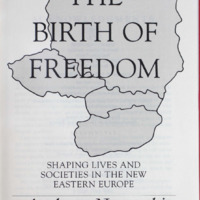-
Title
-
The birth of freedom : shaping lives and societies in the new Eastern Europe
-
Description
-
In The Birth of Freedom, Andrew Nagorski provides an unprecedented personal look at the individuals and issues in the newly free nations of Eastern Europe. He takes readers into the hearts of Poland, Hungary, the Czech Republic, and Slovakia as they undergo the painful yet exhilarating transformation into modern democratic states. As Newsweek's Warsaw Bureau Chief, Nagorski has had access not only to the major figures in the lives of these countries - Lech Walesa, Vaclav Havel, Prime Minister Jozsef Antall of Hungary - but also to the people who will continue to constitute their conscience and soul: writers, poets, artists, clergymen, environmentalists, and blue-collar workers. He examines how former Communists have fared as businessmen, how former dissidents have coped as politicians, and how everyone has struggled to adjust to new, often unexpected roles amid breathtaking change. The upheavals of 1989 in Eastern Europe may have marked the downfall of communism, but they were only the beginning of an even more exciting drama - the conflicts, soaring hopes, and frequent disillusionment that have accompanied the painstaking process of building new societies. Brimming with real-life anecdotes, The Birth of Freedom chronicles the efforts of the Eastern Europeans to claim their place in the new Europe, overcoming not just the political but also the psychological legacy of four decades of subjugation. In these peoples' sometimes exciting and sometimes daunting quest for their new identities, Nagorski has uncovered a spirit akin to that of early America - an exuberance and a belief in principles as these nations turn their ideas of freedom into reality.
-
Identifier
-
450663
-
671782258
-
Creator
-
Nagorski, Andrew
-
Source
-
Brian Lamb Booknotes Collection
-
Gift of Brian Lamb, 2011.
-
Catalog record
-
Language
-
eng
-
Date
-
1993
-
Program air date: October 31, 1993.
-
Publisher
-
Simon & Schuster
-
George Mason University. Libraries. Special Collections & Archives
-
Text
-
Transcription of Annotations
Notes on front endpapers: How has the arts damaged the environment? The power of ideas- p. 30. Lustrace--Czech/Havel. American journalism's influence on east europeans p. 216. Underlinings/notes: Lamb underlines key occurrences, dates, locations in Nagorski's life and career progression. Lamb underlines examples of the secrecy of resistance leaders, figures on underground membership, perils of participation. "Power of ideas." Particular attention is given to Zbigniew Bujak, Vaclav Havel, Lech Walesa, Jozsef Antall and the democratic transitions of Poland, Czechoslovakia, Hugary, and Slovakia as well as market changes, ecological issues and cultural shifts. Lamb notes: communication, radio, VCRs, Havel on the dangers of the West, Gorbachev, non-violent strategy, Secret police. Czechoslovakia, Jan Kavan, the Velvet Revolution, the transition to democracy, ramifications of Soviet life, significance of religious culture, decline of theater, books, and the local film industry and changes in education.
-
Relation
-
Original Booknotes interview
-
Rights
-
This work may be protected by copyright laws and is provided for educational and research purposes only. Any infringing use may be subject to disciplinary action and/or civil or criminal liability as provided by law. If you believe that you are the rights-holder and object to Mason’s use of this image, please contact speccoll@gmu.edu.
 450663.pdf
450663.pdf